Modern businesses are turning towards seamless software solutions to increase efficiency and boost revenue. This asserts the importance of using BI in daily business operations. Business Intelligence offers enhanced productivity by identifying challenges and providing valuable insights. When combined with enterprise resource planning, BI automatically enhances efficiency and productivity. This efficiency turns raw data into actionable insights that can be used to optimize workflow efficiency. This in the long run can help businesses have better revenue growth.
According to Exploding Topics the global Business Intelligence market is expected to hit a staggering $33.3 billion by 2025. Moreover, on average, a company utilizes 3.8 Business Intelligence solutions to improve its operational performance and derive actionable insights. The analytics and BI application market is also witnessing strong growth. By 2026, the figure would amount to $18.5 billion. As this proves, BI applications will see massive dependence by various companies towards data-driven decisions as the business environment around the corner keeps on accelerating in business operations.
In this blog, we’ll understand the basics of ERP and business intelligence, the key differences between them, the integration of business intelligence into ERP, and their benefits.
What is ERP?
Enterprise Resource Planning or ERP are tools that help businesses improve their operational efficiency by optimally managing resources. These tools track and manage critical business data like inventory, customer information, and orders which helps them to automate the processes and increase the overall productivity. A comprehensive ERP suite, assist organizations in planning, budgeting, forecasting, and reporting on financial results. ERP development services allow the integration of multiple business processes to ensure proper data flow. This is done by integrating transactional data from various sources, which eliminates duplication and ensures data integrity with ‘one source of truth.’ Let’s understand what this means by uncovering the fundamentals of ERP.
How Does ERP Work?
ERP systems are designed across a single data structure consisting of a common database. This ensures that the information across the enterprise is based on common denominators. This fundamental framework is then interconnected with business processes including finance, marketing, human resources, and others thereby connecting people who use them.
For instance, consider a company that builds cars by procuring parts and components from multiple suppliers. It may use an ERP system to track the requisition and purchase of these goods. This will ensure that each component across the entire procure-to-pay process uses uniform and clean data connected to enterprise workflows, business processes, reporting, and analytics.
Moreover, when the ERP is well implemented at this automotive manufacturing company, it will be comparatively easy to identify a particular part like front brake pads by part name, material, size, and serial number alongside other non-descriptive items.
What is Business Intelligence?
Business intelligence, or BI, is a technology-enabled approach aimed at empowering businesses in data-driven decision-making. The purpose of BI is also to boost operational efficiency thereby boosting revenue and providing the business with the edge it requires to stay ahead of the competition. BI integrates multiple analytics, data management, and reporting tools with methodologies aimed at effectively managing and analyzing data.
Moreover, as part of BI, organizations collect data both from internal IT systems and from external sources, process it for analysis, query it, and generate data visualizations, dashboards, and reports. These outputs enable businesses to access analytics results to enable rational decision-making and strategic planning.
How Does Business Intelligence Work?
When we talk about business intelligence architecture, it has a lot of other components besides BI software. These components function together to boost organizational efficiency and enable data-driven decision-making. BI has evolved to encompass various techniques intended to improve business performance, such as:
1.Data mining: Using databases, statistics, and ML to discover patterns in enormous datasets.
2. Reporting: Data analysis is presented to the relevant stakeholders so that quick and rational decisions can be made.
3. Performance metrics and benchmarking: Comparing current performance with past performance to evaluate the progress by using tailored dashboards.
4. Descriptive analytics: Gives an overview of past trends.
5. Querying: Asking specific questions to obtain required insights.
6. Statistical analysis: Descriptive analytics is further enhanced by statistical analysis, which helps to track patterns.
7. Data Visualization: Data analysis is transformed into formats such as charts, graphs, and histograms for better understanding.
8. Visual Analysis: Insights are communicated using visual storytelling. This helps to explore data in real time.
9. Data preparation: It involves aggregating multiple data sources, defining essential metrics, and making them available for analysis.
Now that we have covered the basics of ERP of Business Intelligence, we’ll understand how can you integrate Business intelligence in ERP and why is it important.
Integrating Business Intelligence in ERP
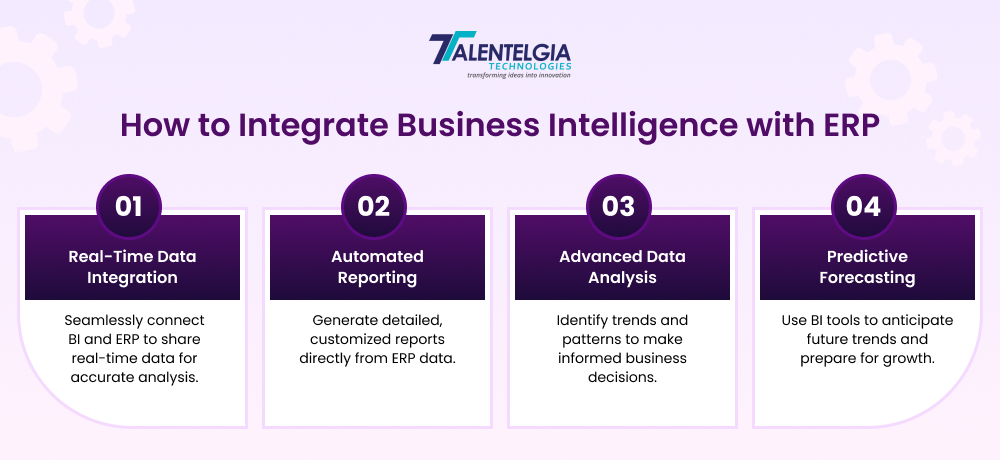
Integrating Business Intelligence with ERP can provide an organization with valuable insights that can help give a bird’s eye view of the entire business operations. This will help in not only generating long-term revenue growth but also uncover any shortcomings.
Think of it as combining the operational efficiency of ERP with the rational and strategic thinking of Business Intelligence. While ERP takes of day-to-day operations in finance, HR, marketing, and others, Business Intelligence turns this data into actionable insights. Some of these integration ways include:
Data Integration: BI and ERP systems can be integrated to share information in real-time. This will ensure that the analysis done by BI is always on real-time data. Moreover, it will also help businesses make more accurate decisions from current information.
Reporting: BI tools are also capable of creating unique reports that use data pulled directly from the ERP system. It enables businesses to create detailed and accurate reports on business operations.
Data Analysis: BI tools can analyze data from the ERP system to indicate trends and patterns that help organizations make informed business decisions.
Forecasting: BI tools can make future predictions based on data from the ERP system. This can help businesses plan for future growth and anticipate issues that might occur.
Benefits of Business Intelligence In ERP
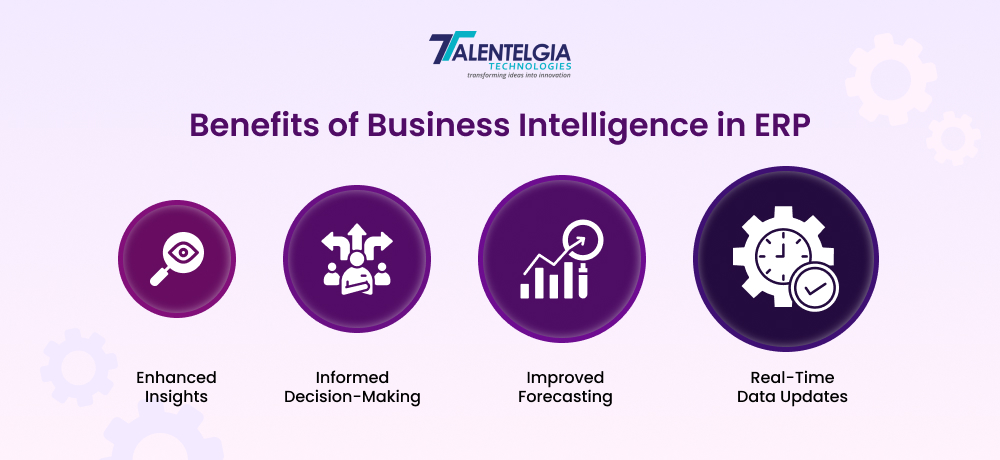
Enhanced Insights: Integrating business intelligence with ERP systems gives businesses a clearer understanding of their daily operations. This deeper visibility helps uncover patterns, trends, and areas that need improvement, enabling organizations to take proactive measures.
Informed Decisions: BI in conjunction with ERP helps determine better decision-making, as it becomes more informed and impactful. Moreover, with real-time access to KPIs and critical data, businesses have opportunities to cut costs, boost revenue, and streamline processes more easily.
Improved Forecasting: BI tools can provide predictive and prescriptive analysis. This means smooth operations and clears the path to sustainable long-term growth.
Real-time data updates: BI and ERP together ensure seamless real-time data updates so that all analyses remain current and accurate. This ultimately empowers businesses to make even quicker, data-driven decisions with absolute confidence.
Data Integration and Centralization: Integration of BI tools with ERPs allows the centralization of data from functions and processes within a single location. The centralization of information will allow for an integrated view of the organization’s performance because decision-makers will have access to all the relevant information through a single point. This integration makes data that is produced in different segments of the business aligned, accurate, and accessible for better strategic planning and operational effectiveness.
Conclusion
Integrating business intelligence with ERP systems has turned out to be a crucial step for modern businesses to stay ahead of the competition effectively. By combining the operational efficiency of ERP with the strategic overview BI, organizations can unlock the full potential of their data. This, not only ensures real-time updates and rational decision-making but also enables businesses to anticipate trends, optimize operations, and achieve sustainable growth. And, while a full-scale integration of business intelligence in ERP might take a few years, the the process has already begun to showcase its potential. Now it depends on the businesses as to how effectively they can integrate business intelligence in ERP and extract the full potential of this transformative technology.


 Healthcare App Development Services
Healthcare App Development Services
 Real Estate Web Development Services
Real Estate Web Development Services
 E-Commerce App Development Services
E-Commerce App Development Services E-Commerce Web Development Services
E-Commerce Web Development Services Blockchain E-commerce Development Company
Blockchain E-commerce Development Company
 Fintech App Development Services
Fintech App Development Services Fintech Web Development
Fintech Web Development Blockchain Fintech Development Company
Blockchain Fintech Development Company
 E-Learning App Development Services
E-Learning App Development Services
 Restaurant App Development Company
Restaurant App Development Company
 Mobile Game Development Company
Mobile Game Development Company
 Travel App Development Company
Travel App Development Company
 Automotive Web Design
Automotive Web Design
 AI Traffic Management System
AI Traffic Management System
 AI Inventory Management Software
AI Inventory Management Software
 AI Software Development
AI Software Development  AI Development Company
AI Development Company  AI App Development Services
AI App Development Services  ChatGPT integration services
ChatGPT integration services  AI Integration Services
AI Integration Services  Generative AI Development Services
Generative AI Development Services  Natural Language Processing Company
Natural Language Processing Company Machine Learning Development
Machine Learning Development  Machine learning consulting services
Machine learning consulting services  Blockchain Development
Blockchain Development  Blockchain Software Development
Blockchain Software Development  Smart Contract Development Company
Smart Contract Development Company  NFT Marketplace Development Services
NFT Marketplace Development Services  Asset Tokenization Company
Asset Tokenization Company DeFi Wallet Development Company
DeFi Wallet Development Company Mobile App Development
Mobile App Development  IOS App Development
IOS App Development  Android App Development
Android App Development  Cross-Platform App Development
Cross-Platform App Development  Augmented Reality (AR) App Development
Augmented Reality (AR) App Development  Virtual Reality (VR) App Development
Virtual Reality (VR) App Development  Web App Development
Web App Development  SaaS App Development
SaaS App Development Flutter
Flutter  React Native
React Native  Swift (IOS)
Swift (IOS)  Kotlin (Android)
Kotlin (Android)  Mean Stack Development
Mean Stack Development  AngularJS Development
AngularJS Development  MongoDB Development
MongoDB Development  Nodejs Development
Nodejs Development  Database Development
Database Development Ruby on Rails Development
Ruby on Rails Development Expressjs Development
Expressjs Development  Full Stack Development
Full Stack Development  Web Development Services
Web Development Services  Laravel Development
Laravel Development  LAMP Development
LAMP Development  Custom PHP Development
Custom PHP Development  .Net Development
.Net Development  User Experience Design Services
User Experience Design Services  User Interface Design Services
User Interface Design Services  Automated Testing
Automated Testing  Manual Testing
Manual Testing  Digital Marketing Services
Digital Marketing Services 
 Ride-Sharing And Taxi Services
Ride-Sharing And Taxi Services Food Delivery Services
Food Delivery Services Grocery Delivery Services
Grocery Delivery Services Transportation And Logistics
Transportation And Logistics Car Wash App
Car Wash App Home Services App
Home Services App ERP Development Services
ERP Development Services CMS Development Services
CMS Development Services LMS Development
LMS Development CRM Development
CRM Development DevOps Development Services
DevOps Development Services AI Business Solutions
AI Business Solutions AI Cloud Solutions
AI Cloud Solutions AI Chatbot Development
AI Chatbot Development API Development
API Development Blockchain Product Development
Blockchain Product Development Cryptocurrency Wallet Development
Cryptocurrency Wallet Development About Talentelgia
About Talentelgia  Our Team
Our Team  Our Culture
Our Culture 
 Healthcare App Development Services
Healthcare App Development Services Real Estate Web Development Services
Real Estate Web Development Services E-Commerce App Development Services
E-Commerce App Development Services E-Commerce Web Development Services
E-Commerce Web Development Services Blockchain E-commerce
Development Company
Blockchain E-commerce
Development Company Fintech App Development Services
Fintech App Development Services Finance Web Development
Finance Web Development Blockchain Fintech
Development Company
Blockchain Fintech
Development Company E-Learning App Development Services
E-Learning App Development Services Restaurant App Development Company
Restaurant App Development Company Mobile Game Development Company
Mobile Game Development Company Travel App Development Company
Travel App Development Company Automotive Web Design
Automotive Web Design AI Traffic Management System
AI Traffic Management System AI Inventory Management Software
AI Inventory Management Software AI Software Development
AI Software Development AI Development Company
AI Development Company ChatGPT integration services
ChatGPT integration services AI Integration Services
AI Integration Services Machine Learning Development
Machine Learning Development Machine learning consulting services
Machine learning consulting services Blockchain Development
Blockchain Development Blockchain Software Development
Blockchain Software Development Smart contract development company
Smart contract development company NFT marketplace development services
NFT marketplace development services IOS App Development
IOS App Development Android App Development
Android App Development Cross-Platform App Development
Cross-Platform App Development Augmented Reality (AR) App
Development
Augmented Reality (AR) App
Development Virtual Reality (VR) App Development
Virtual Reality (VR) App Development Web App Development
Web App Development Flutter
Flutter React
Native
React
Native Swift
(IOS)
Swift
(IOS) Kotlin (Android)
Kotlin (Android) MEAN Stack Development
MEAN Stack Development AngularJS Development
AngularJS Development MongoDB Development
MongoDB Development Nodejs Development
Nodejs Development Database development services
Database development services Ruby on Rails Development services
Ruby on Rails Development services Expressjs Development
Expressjs Development Full Stack Development
Full Stack Development Web Development Services
Web Development Services Laravel Development
Laravel Development LAMP
Development
LAMP
Development Custom PHP Development
Custom PHP Development User Experience Design Services
User Experience Design Services User Interface Design Services
User Interface Design Services Automated Testing
Automated Testing Manual
Testing
Manual
Testing About Talentelgia
About Talentelgia Our Team
Our Team Our Culture
Our Culture
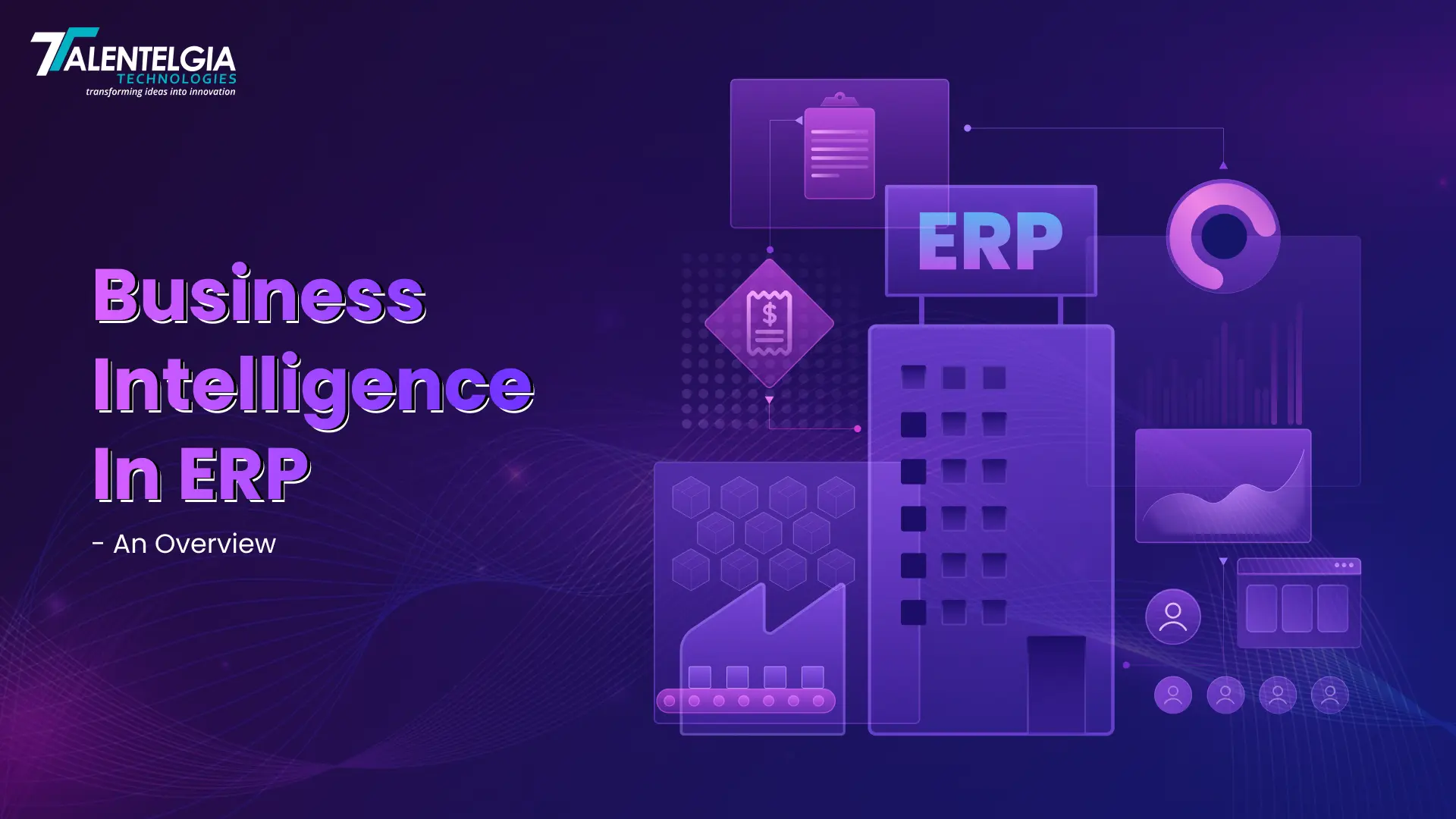



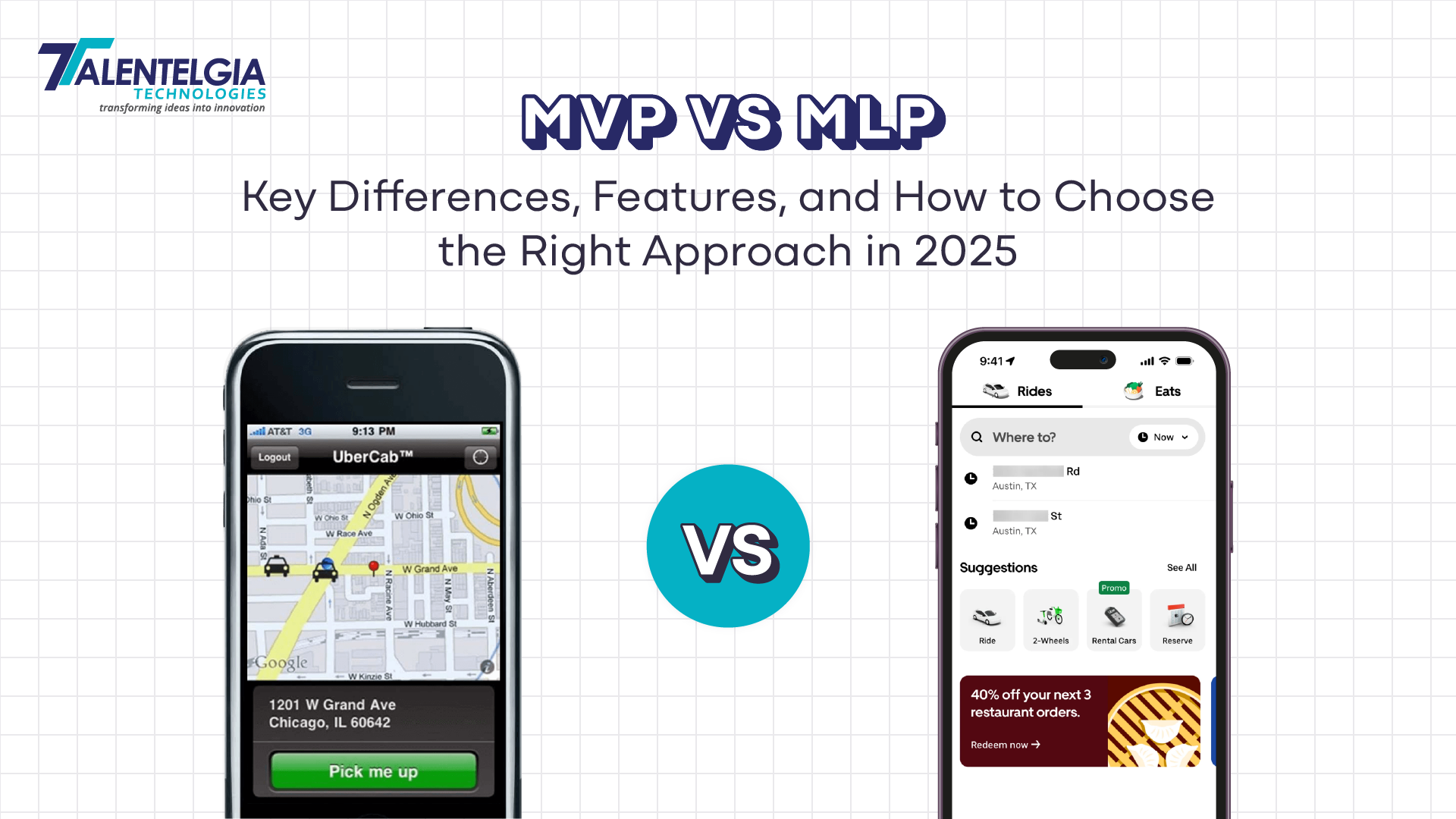
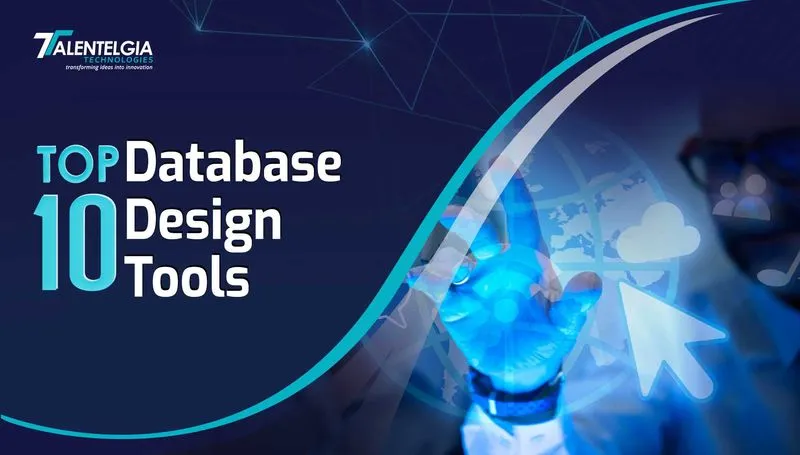











 Write us on:
Write us on:  Business queries:
Business queries:  HR:
HR: 




